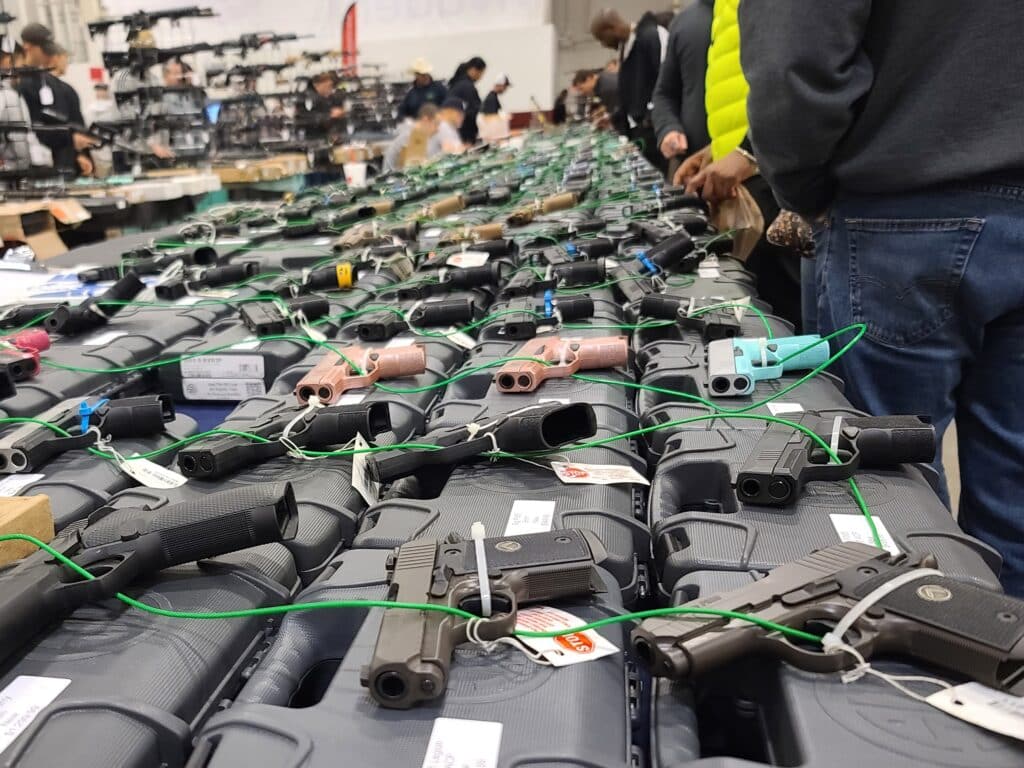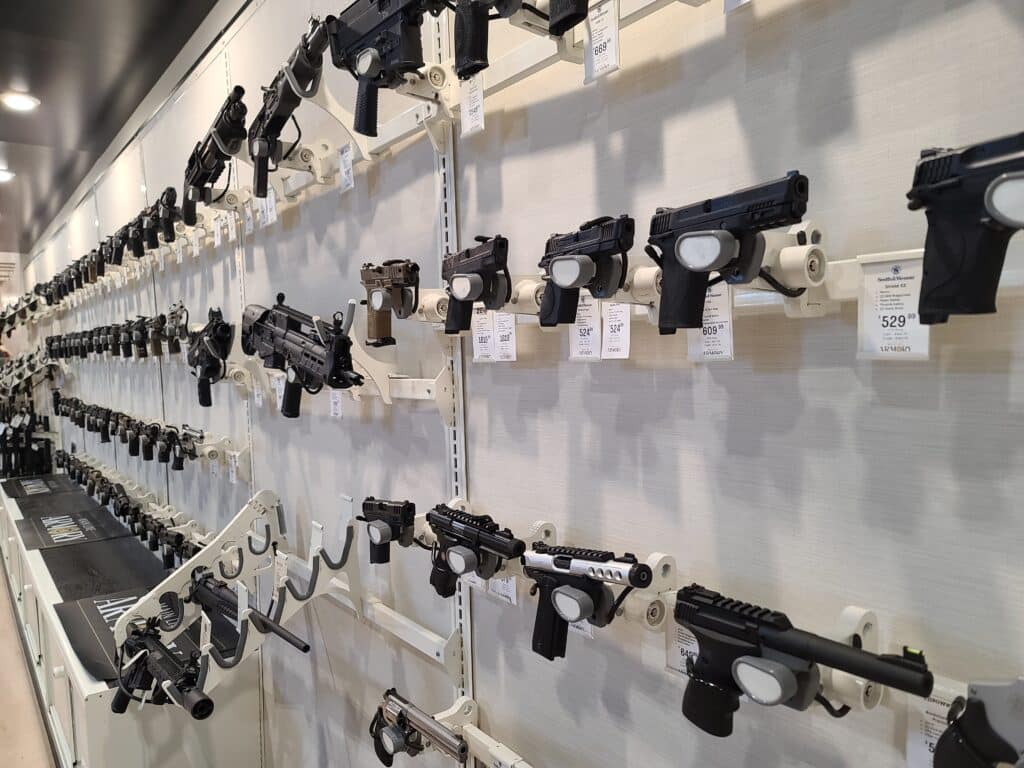Happy New Year’s Eve! I hope your 2023 was fruitful and your 2024 is even better.
The upcoming year is certain to see major developments in gun policy, politics, and culture. We’ll be covering it all as it unfolds of course. But Contributing Writer Jake Fogleman and I have put together a look forward at what to watch and expect in 2024.
I also take a look at the next few weeks in Hawaii specifically. We broke the story that the state has effectively cut off gun sales for the next few weeks. But I explain why it will be harder than it seems to undo that cut-off through legal action.
Plus, gun-rights lawyer Kostas Moros joins the podcast to explain his recent win against California’s new “gun-free zones.” Although, that win has been tempered a bit because an appeals court just put a stay on it. So, California’s law will go into effect for now as the case continues to unfold.

Analysis: What’s in Store for Guns in 2024 [Member Exclusive]
By Stephen Gutowski and Jake Fogleman
2023 was a momentous year for American gun politics. 2024 stands to be even more consequential.
This year was the first full year since the Supreme Court set a new legal standard for lower courts to use when reviewing gun cases in New York State Rifle and Pistol Association v. Bruen. That gave rise to more than 1,252 Second Amendment court challenges, a rate of more than three per day, on laws ranging from hardware bans to carry permit rules and even categories of people barred from owning firearms.
At the same time, the year featured another spate of horrific mass shootings—the second-highest single-year total on record, according to The Violence Project. The continued scourge invigorated new calls for gun control that extended to places where it has not been traditionally popular, like Tennessee and Maine.
It’s likely both sides of the gun debate will be energized heading into the new year. Here’s a look at some of the big things to watch for in 2024.
SCOTUS
Chief among the things to watch in the new year is the Supreme Court. The High Court has already held oral arguments in U.S. v. Rahimi. That case, the first Second Amendment challenge since Bruen, is about the constitutionality of the federal gun ban for those subject to domestic violence restraining orders. SCOTUS took it after the Fifth Circuit struck down the law in February 2023.
The Court will hand down its decision in that case sometime during the first half of the new year. The results of that decision will probably clarify the limits of the text, history, and tradition test on at least one category of people prohibited from owning guns under federal law. It could also shine a light on the broader question of who can be disarmed under the Second Amendment in general.
In addition to Rahimi, the Court will decide the fate of two other prohibited persons challenges in 2024. The Department of Justice officially asked the justices to take up Range v. Garland and U.S. v. Daniels in October. Those cases deal with gun rights for non-violent felons and marijuana users, respectively. In each instance, current federal law makes it a felony for people in either category to possess firearms. However, in both cases, a federal appeals court ruled those prohibitions were unconstitutional as applied to the plaintiffs.
The Supreme Court is currently set to decide whether to take up Range and Daniels during one of its January conferences. Watch for the Court to either take up the cases or otherwise act on them when it rules in Rahimi.
The Court in 2024 will also hold oral arguments in two additional cases that don’t implicate the Second Amendment but are nevertheless related to guns.
The first case deals with the National Rifle Association. The Court will decide whether a New York government official violated the group’s First Amendment rights by warning financial companies not to do business with the group or other “gun promotion organizations” in a 2018 letter.
The second deals with the legality of the Trump Administration’s unilateral ban on bump stocks and whether the ATF has the authority to reclassify previously lawful gun accessories without an act of Congress. That case has the potential to be consequential for many gun-rights owners because it could impact the Biden Administration’s similar bans on pistol braces and so-called ghost guns. The ATF’s rules have affected millions of Americans, and so will the outcome of the cases against them.
Then there are the cases that haven’t made it to the Court during normal order just yet. None of the challenges it granted, vacated, and remanded after Bruen have made their way back up yet. Young v. Hawaii was settled, but the others are still waiting on lower court rulings.
Plus, a whole crop of new cases based on laws passed since Bruen are inching their way closer to the Court as well. 2024 could see the Court take up a case against one of the Bruen-response laws that instituted sweeping new “gun-free zones” as a way to reduce carrying despite the landmark ruling. Or it could take up a hardware ban case, like one of the several against “assault weapons” or ammunition magazines working through the lower courts.
Similarly, it will also be worth watching how the Supreme Court responds to emergency requests for early intervention in lower court battles over various gun-control laws. In 2023, the justices proved hesitant to get involved, at least when gun-rights plaintiffs made requests. Whether it intervenes in any lower court gun cases in the new year or continues its streak of deference will provide insight into how motivated the court is to superintend its Second Amendment jurisprudence.
State Gun Law Changes
2023 was a busy year for new state gun laws. Expect to see that trend continue in 2024.
One state to keep a particularly close eye on will be Maine. Though the state has a strong bipartisan tradition of protecting gun rights, the October 25 massacre in Lewiston has created new momentum for gun-control activists and led to a change of heart for some of the state’s politicians who have rejected stricter gun laws in the past. No single concrete proposal has been established thus far. But everything from background checks for private sales and waiting periods to an “assault weapon” ban and “red flag” law expansion appear to be on the table for debate when the legislature reconvenes in January.
Other states to watch for on the gun control side include Democratic-controlled states where assault weapon ban bills failed in 2023 but will likely be heard again in the new year, like New Mexico and Colorado.
New Mexico, in particular, will be worth watching because Governor Michelle Lujan Grisham (D.) has recently decided to make gun control a top issue for her remaining tenure in office. Furthermore, she has already pledged to revive the state’s failed semi-auto ban effort under a new twist inspired by one of her state’s U.S. Senators. If it passes, the federal GOSAFE Act proposal could become a new model for other lighter-blue jurisdictions to replicate.
On the gun rights side of the ledger, expect a push for permitless carry in the few remaining states where it is politically feasible—Louisiana and the Carolinas—to return in full force. Louisiana seems most likely to become the 28th permitless carry state in 2024, with its newly-elected Republican Governor, Jeff Landry, set to take office at the beginning of the year. The state’s legislature has shown a willingness to pass permitless carry legislation in the past, but it was always scuttled by current term-limited Governor John Bel Edwards (D.).
Executive Agency Rulemaking
Following the recent trend of enacting gun restrictions via administrative power, 2024 should see at least a couple of new gun rules added to the Federal Register.
The ATF’s “Engaged in the Business” rule is set to be finalized in the new year after its 90-day public comment period ended earlier this month. The proposed rule would set limits on how frequently an unlicensed seller could offer up guns to customers, how often they can sell the same kind of gun, and what kind of condition the firearm has to be in before the seller would be required to get a Federal Firearms License (FFL). It stems from a language tweak in the Bipartisan Safer Communities Act signed into law by President Biden in 2022 and is designed to, in his words, “move as close to universal background checks as possible within existing law.”
The other potential rule to watch for in 2024 is the U.S. Department of Commerce’s proposal to clamp down on civilian firearm sales in other countries via export controls. As previously covered in The Reload‘s exclusive reporting, the current draft proposal of the rule would essentially require American gun companies to spearhead gun-control efforts in foreign countries by collecting passport information from civilian gun buyers.
November Presidential Election
The 2024 elections will undoubtedly have an outsized impact on guns. On the Democratic side, President Biden is running for re-election as the most overtly pro-gun-control presidential candidate in recent memory. He has a track record that features numerous executive order gun bans and his signature on the first law enacting new federal gun restrictions in decades to bolster those bona fides.
But that record of pushing for restrictions will run up a messy personal drama in the most public way possible during 2024. Biden’s son, Hunter, is currently facing multiple indictments for violating federal gun laws related to purchasing and possessing a firearm while using crack cocaine. Furthermore, Hunter’s legal team has already initiated a constitutional challenge to those charges under the Second Amendment using the Bruen test that Joe Biden roundly criticized when the Supreme Court handed it down. How President Biden navigates that apparent contradiction between his political stances and his son’s conduct will be worth watching.
Whichever way US v. Biden comes out, the President’s aggressive pursuit of new gun restrictions hasn’t boosted his approval to this point. He’ll have the first 11 months of 2024 to see if that changes.
On the Republican side, the current frontrunner for the party’s 2024 remains Donald Trump, who is uniquely vulnerable to the right on the issue of guns.
Despite cozying up to groups like the NRA, he achieved relatively few pro-gun wins during his first tenure in office. In 2017, he signed a bill repealing an Obama-era Social Security gun restriction for those who couldn’t manage their own financial affairs. In 2020, he added gun businesses to the list of essential businesses under federal guidelines.
He also endorsed stricter gun laws at different points throughout his presidency. In the wake of the Parkland shooting, he said “take the guns first, go through due process second” in support of a national “red flag” law. He didn’t follow through on that because his first impeachment ended any chance of a bipartisan deal on guns. However, after the Las Vegas shooting, he did follow through and instituted the aforementioned bump stock ban, which has since been found unconstitutional by two federal appeals courts and now faces Supreme Court review.
Thus far, alternative Republican presidential candidates haven’t gone after that vulnerability, nor have they campaigned on gun issues much at all through the primary process. Whether they change strategy in the coming weeks as the window to gain ground on the former president closes could be consequential.
But if Trump holds on to his substantial lead through the primaries, and manages to stay on the ballot, the rematch between him and Biden will be unprecedented in many ways. Trump is currently ineligible to buy new guns because of his multiple federal felony indictments relating to the January 6th riot and other attempts to undo the outcome of the 2020 election. It’s possible, perhaps even likely, he’ll be convicted on some of those charges before the election.
That would, of course, make it illegal for Trump to own or even possess any guns.
Yet, on policy, the contrast between him and Biden would remain stark. Just as Biden is likely to run on his record of tightening gun restrictions, Trump is likely to run in the exact opposite direction. The pro-gun candidate may not be able to own guns as election day 2024 arrives, but pro-gun voters may still find his policy positions preferable to the alternative.
Of course, the other outcomes of Trump’s prosecutions will probably overshadow whatever effect they may have on the 2024 fight over gun policy. In fact, the difficult and polarizing political and philosophical questions raised by Trump’s prosecutions, as well as the actions that led to them, could cause voters to minimize gun policy in their decision-making process. Then again, so could deeply practical concerns over inflation and the economy.
But a few new gun bans or significant Second Amendment decisions from the Supreme Court could always throw gun politics back to the top of mind for voters.
Gun Sales
Finally, the presidential race also has a lot of potential to impact Americans’ demand for firearms. Gun sales have traditionally spiked during presidential election years, particularly those featuring stark gun policy choices. So, expect that to happen once again in 2024. How that sales boost impacts the gun industry’s new sales floor will be another telling data point for how robust the firearms market is after adding a substantial amount of new gun owners in recent years.
No matter how you slice it, 2024 is shaping up to be yet another busy year for gun politics and policy.
Podcast: Gun-Rights Lawyer Explains Recent Win Against California’s New Carry Restrictions [Member Early Access]
By Stephen Gutowski
This week, we’re looking at a federal judge’s ruling against the Golden State’s latest “gun-free zones.”
So, we’ve got one of the lawyers who won the case on to explain it. Kostas Moros, who represented the California Rifle and Pistol Association (CRPA), joins the show to recount his arguments and the judge’s decision.
The decision was a total victory for Moros and the plaintiffs. The judge enjoined all of the challenged sensitive places restrictions. He even went a bit beyond what the plaintiffs asked for and struck down the parking lot ban associated with many of those places.
Moros argues the judge, in contrast with an opposing decision out of the Second Circuit on a similar New York law, used the proper analysis when approaching the question of where guns can be banned by default. He said many of the locations existed at the time of the Founding but had no such bans. Under the Supreme Court’s Bruen decision, he said that means the modern regulation can’t stand.
The judge didn’t stay his order. However, the day after we recorded the podcast, an appeals panel did. So, California’s law will go into effect on January 1st as the case against it continues to unfold. It’s not clear how long the stay will last, but Moros said he and CRPA will keep fighting the law as long as necessary to win.
Plus, Contributing Writer Jake Fogleman and I discuss our exclusive story on how Hawaiians are effectively barred from buying guns for the next few weeks.
You can find the show on your favorite podcasting app or by clicking here. Video of the episode is available on our YouTube channel. Reload Members get access on Sunday, as always. The show goes public on Monday.

Analysis: Why Hawaii’s Gun Sales Ban Will be Hard to Challenge in Court [Member Exclusive]
By Stephen Gutowski
Gun sales have effectively been halted in Hawaii. That’s a pretty straightforward Second Amendment violation, but successfully fighting it in court will be complicated.
There are several reasons for that. Most of them are practical rather than legal.
The most prominent has to do with the nature of the ban. It’s not a straightforward sales ban. Instead, it stems from how Hawaiian officials have seemingly bungled implementing the state’s new training requirements. Law enforcement officials need to certify instructors under the state’s new gun-carry law once it goes into effect in a few days, but none of them seem to have created those new certification processes yet. That means, for now, nobody can obtain the training that’s required to buy a gun or get a gun-carry permit because nobody is yet certified to teach it.
But this issue could be worked out within the next few weeks. That’s because, at least according to the activists who’ve brought the issue to public attention, the effective shutdown of sales and carry permitting wasn’t necessarily intentional. It was the result of negligence or incompetence.
“I guess I shouldn’t be surprised. But I am a little bit surprised that here we are with January 1 coming up in a few days, and they didn’t do it despite having six months,” Alan Beck, a gun-rights lawyer who has challenged a number of Hawaii restrictions over the years, told The Reload.
That means it can probably be fixed relatively quickly if officials choose to do so. And that’s what Honolulu Deputy Corporation Counsel Daniel M. Gluck told Beck they’re trying to do.
“Because instructor verification is a prerequisite to training certification, which is in turn a prerequisite to receiving a permit to acquire, we wanted to start the verification process as early as possible so we don’t delay any permit applications,” Gluck said in an email to Beck reviewed by The Reload.
The Honolulu Police Department (HPD) has a public hearing scheduled for January 9th, 2024, to decide on the new certification standard. Beck said it would take at least ten days after that point for the certifications to be finalized. But Gluck insisted Honolulu would be able to smoothly transition to the new certification process that would allow the city to comply with the 40-day processing limit in the new law.
Still, given the Hawaii Firearms Coalition claims HPD stopped issuing new permits on December 18th, gun sales there will have been cut off for nearly two months under the most optimistic outcome. And, of course, a right delayed is a right denied. So, the fact the issue may be resolved in the next few weeks isn’t a good legal reason a case against it wouldn’t succeed.
But it is a good practical reason why a legal effort may not materialize. The length of the delays will impact the likelihood of a lawsuit being filed. The longer the delays last, the more likely somebody files suit.
Mootness is the main impediment here. The faster the issue gets resolved, the less likely a plaintiff can get an order against Hawaii, and the more likely the case will simply be dismissed. After all, the officials can eliminate the harm caused to the plaintiffs by simply issuing them the permits they seek.
In practice, that means anyone who filed a case would probably be out of the money they used to do so.
Clearing that practical hurdle is more challenging than it appears at first glance, too. Since the sales shutdown seems to be primarily the effect of local law enforcement’s failure to properly prepare for the new state law rather than the law itself, a legal challenge would probably have to be brought against multiple officials across the state. Plus, Hawaii is small and has relatively little demand for guns and relatively little gun-rights activism.
In fact, Beck is primarily responsible for the numerous legal victories against the state’s gun restrictions. He isn’t directly backed by any major national gun-rights group and is already suing the state over the underlying law’s gun-carry restrictions, which are intentional and will be ripe for challenge for a much longer period of time. Beck is considering a suit over the sales shutdown too, but if he doesn’t file one, there aren’t many other lawyers likely to take up the cause.
Then there’s the conservative nature of the federal judiciary to contend with. Not in the ideological sense but in the legal sense. Judges are much less likely to intervene in the conduct of elected officials if the issue is likely to be resolved relatively soon without them getting involved–even if the legal standard suggests they ought to. Hawaii also happens to sit in the Ninth Circuit, where plaintiffs are unlikely to find a judge eager to process a Second Amendment claim quickly. A potential plaintiff is more likely to run into a judge inclined to hope the situation works itself out before they’re forced to issue any kind of ruling.
None of that means a case isn’t coming or couldn’t succeed. There are creative ways to extend the viability of a case like this beyond when the permitting gets fixed, such as claiming a nominal amount of monetary damages. And, more realistically, the gun sales shutdown may extend for months rather than weeks.
Gluck’s assurances that Honolulu would be able to start issuing purchase permits and carry licenses within 40 days seem optimistic. Even if the city finalizes its process by January 19th, it still has to give the certifications to instructions, and those instructors would then have to teach classes to the people seeking permits. Those students would then have to turn in their proof of training for processing by HPD. The city would have to perform each step very quickly to meet that 40-day deadline.
Even if Honolulu does, other jurisdictions are further behind the curve. The counties of Hawai’i and Kauai haven’t even scheduled a hearing yet, according to Beck. The shutdowns there could stretch out longer and be more susceptible to court challenges.
Still, getting a court to undo what is effectively a total ban on gun sales in an American state is more difficult than people might expect.
That’s it for now.
I’ll talk to you all again soon.
Thanks,
Stephen Gutowski
Founder
The Reload







